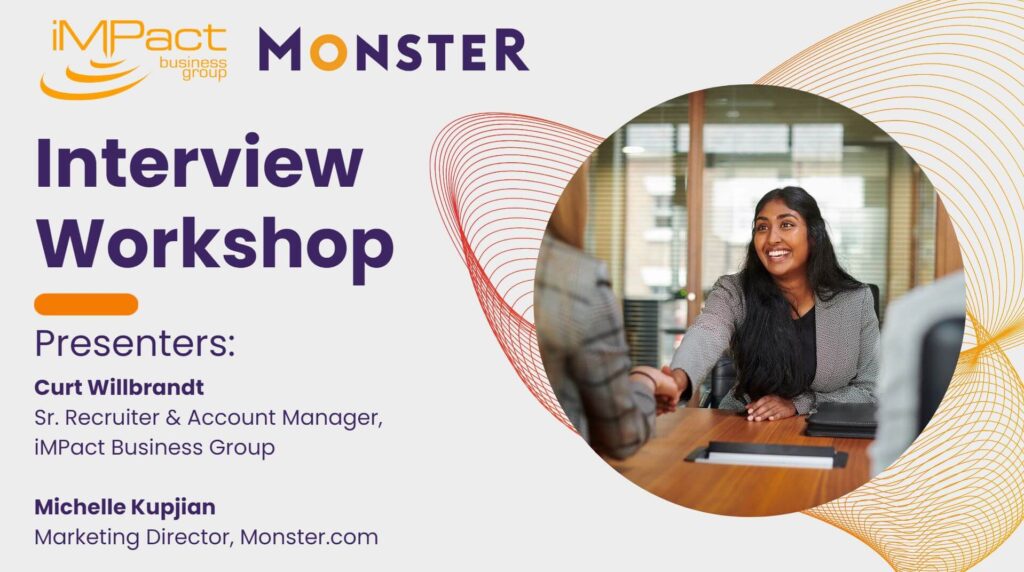Thank you to everyone who registered for and attended our Job Interviewing workshop that we hosted with Monster. If you weren’a able to watch it live, or would like to watch it again, please find the recording below. During the signup process we asked participants if they had any specific questions for us. We tried to address as many as possible during the live event, but weren’t able to get to all of them. Here are all the questions with answers from our two presenters. If you have an interview question that was not covered in the webinar or here, or any comments on job interviewing, please share your thoughts in the comments.
Recording of our Live Interview Workshop with Monster on October 1, 2024
How do I ace the final interview?
Focus on building rapport with the interviewer and reinforcing why you are the best fit for the role. Be ready to discuss specific examples of projects or work you’ve done at previous companies that demonstrate your expertise. When giving examples, clearly explain your role in the project and how your contributions positively impacted the business, such as increasing revenue, improving efficiency, or solving a critical problem. This shows not only your skills but also the value you bring to the company. Don’t forget to ask insightful questions that show your interest in the company and role.
How do I answer the questions during the initial screening interview
Not clear on this question, but regarding pre-screening questions: be honest and concise in your responses. These questions are often meant to determine if you meet basic qualifications. Be sure to mention your skills and experiences directly related to the job. Find potential interview questions here.
Ageism
Everyone Wants 30 Years of Experience in a 20-year-old body.
Keep your skills current and fully listed in your resume, It is OK to remove dates of Graduation from your College Degrees in your resume, but at some point, you may be required to provide them in an application.
Ageism…I am 62 and sometimes am used as an SME benchmark for a Treasurer role but some young HR leaders disqualify as they think I won’t work long and I should be retired. I love working. How does one manage youth preferences?
You can’t manage this, but you can focus on how well you align to the role that is open and also stress that you’re looking for a place to work for the foreseeable future as you have no plans to retire any time soon since you love what you do. Emphasize your experience, adaptability, and openness to learning new tools or methods. Highlight how your experience adds value, particularly with problem-solving or leadership.
Getting Hired when you an older job seeker
Keep your resume current, make sure you’re able to demonstrate relevant and translatable skills to the new role and avoid focusign on age, you can’t change it and the employer is not technically allowed to use it as a hiring criteria
Are cover letters read much these days?
It is best to put the intent of a cover letter into an initial summary paragraph in your resume, the message won’t get discarded or lost that way and everyone who reads your resume will see it.
Are employers allowed to give you feedback to a potential candidate? And if so why isn’t it being exercised in management?
They are allowed, but due to the litigious nature of business a firm may be limited in what they are willing to share because someone may have sued them in the past, hence why may employers will not allow staff to give professional references and will only validate dates of employment, it’s from the fear of litigation.
Behavioral interviewing
Behavioral interviewing tends to focus on asking lots of questions where they want you to describe past behaviors with the expectation that future behaviors can be predicted from past ones, the flaw is that the circumstances may never be exactly the same, so it’s best to Google Behavioral interviewing and study it’s core concepts so you understand what the questions are really aiming for.
How are resumes sorted out by HR or by AI?
AI may help, but it’s people who ultimately choose who to interview, so the quality of your resume often times dictates if you are going to get an interview request. If a role is flooded with resumes, most Recruiters will start interviewing once they have at least 3 viable candidates since they could have dozens of unqualified candidates to weed through, so they may not have time to get through all of the applicants they receive due to a large number of unqualified candidates overloading the system.
How do you go about getting feedback on your interview performance?
Be direct and ask for it, at the end of the interview ask if there is any reason why they won’t recommend you move on to the next round so you can address it in real-time, also ask the Recruiter or company HR contact what feedback they received with the intent of clearing up anything that was misperceived shortly after the interview
How do you handle being asked why you’re leaving a company if you’ve been wrongfully terminated from your role?
Be honest without being negative. Explain that the situation didn’t align with your values or goals and focus on what you learned from the situation, emphasizing how you’ve grown. Avoid speaking negatively about your previous employer, and emphasize what you’re looking for in the future.
How do you navigate the why did you leave your last position question if you were fired?
Answer with honesty and as briefly as possible, give facts not emotions, and if you had personal circumstances that led to the firing that are no longer an issue, make sure you state that. Don’t criticize the past employer even if they were the problem, just let the interviewer know that you just didn’t have good chemistry with your past boss. If your own actions led to a justifiable firing, you have to own it and explain how you’ve grown/changed your approach since.
How do you handle the pivot when going from one career to a completely different one? For example, going from customer service to project management.
Describe the translatable skills from our past experience that are still useful in the new role, then discuss the steps/training you have taken to prepare yourself for the new role…
How do you navigate the ‘why did you leave your last position’ question if you were fired?
With honesty and as briefly as possible, give facts not emotions, and if you had personal circumstances that led to the firing that are no longer an issue, make sure you state that. Don’t criticize the past employer even if they were the problem, just let the interviewer know that you just didn’t have good chemistry with your past boss. If your actions led to a justifiable firing, you must own it and explain how you’ve grown/changed your approach since.
How do you tailor a follow-up thank you email after the hiring manager interview when it feels like the job is not the right fit but you want to be considered for other roles in the future? Do you wait for them to reject you or pre-empt?
The Thank You letter should be short, reference items from the interview, and be professional, regardless, since the other party invested time in meeting you, it’s always better to get offered a role you may end up turning down, than to not receive the offer to know what you are turning down, never jump the gun to say no thanks, politely decline with an explanation that you are still very interested in the firm, but in a different role. When an employer wants to hire you, they are the most receptive to your input.
How NOT to get SCAMMED in the technology industry by crooked foreign recruiters?
Be mindful of unsolicited job offers, especially those that request sensitive information or payment. Research the recruiter and company thoroughly before answering. You may even find insight from related threads on Reddit. And finally, as with most things, follow your gut. If something doesn’t feel right, it probably isn’t.
How to address job transitions?
With accuracy and facts, keep negativity and emotion out of how you present multiple layoffs or company closings.
How to answer interviewer questions
Directly, honestly, with a results focus, tell the interviewer how something you did or know how to do adds value in the work you’re doing, what was the ROI (Return on Investment – ie. the business benefit of what you did), did your efforts improve quality, decrease costs, improve delivery time, avoid other problems, how did your work improve things?
How to apply to jobs that require past history with little to no work experience in that field?
Requires a resume that can highlight translatable skills and one where you demonstrate that you have been studying or training to move into that field.
How to come across as more certain and less nervous?
Preparation is the key, know the role, know your own work history, and practice with a friend to get genuine feedback that is emotionally safe, focus on the fact that you don’t have the job today – so the worst that can happen to you is that you still don’t have the job tomorrow. Tell the interviewer if you’re a bit nervous and given them an opportunity to help you feel more comfortable.
How to dress for virtual interviews?
Similar to an in-person interview, wear an outfit that makes you feel confident and professional, dress for success and to impress even if for a Video interview
How to handle answering the question – ‘tell me something about yourself’ hundreds of times without wearing out. Is there a format we should follow when answering?
Interview fatigue is a real thing, while our own story should be our favorite story to tell, we will get bored with it if we have to repeat it too many times, keep the focus on your work history and ideally only the part that is relevant to the role you’re interviewing for. Best defense is to stay conscious of your energy level when having to repeat the same details repeatedly.
How to know if you would fit in with the organizational culture?
That will only come from talking to and meeting multiple team members as part of the interview cycle, some things have to be expereinced 1st hand to really know how good a match there is.
How to land a remote job and where to find a legit remote position?
Tailor your resume for remote roles by highlighting your remote work skills (self-motivation, digital communication, etc.). Filter for “remote job” on job boards such as Monster.com and LinkedIn and search for websites specializing in remote work.
How to look for a different career than what you are currently working at?
You need to find comparable skills from your current work history that can map to a new role, where you still have gaps you need to get some training in those new skills.
Tell Me About Yourself
How to master the question “Tell me about yourself”?
Write it down, practice your delivery, and keep it focused on how your skills/experience match the role, don’t give your life history, stay focused on the role that is open.
What is the intent for asking, “Tell me about yourself?”
The purpose is usually an ice-breaker and let’s you describe relevant skills/experiences to the open role. It’s not really for you to decsribe your life story.You should set the focus on work and the role at hand.
Tell me about yourself? Why should we hire you?
Tell me about yourself – Answered earlier. As to why should we hire you ? You need to list out how your skills and experience align with the job posting, and then describe your strengths. I prefer responding with – if you want a dedicated, team orieinted employee who is dependable, works well with others, pays attention to the details, and has passion for their work, then I am that person. So, coupled with my strenghts including …. (alignment to the Job) I can help your team/firm achieve it’s goals.
Give a real example of tell me about yourself
Use the Past-Present-Future framework:
1. Start with your past (Where you began)
Briefly describe your background, focusing on your relevant experience or education that aligns with the role you’re applying for.
Example: “I started my career in [your field] with a focus on [specific aspect of the field]. At [previous company], I [describe a relevant role or responsibility].”
2. Talk about your current role (Where you are now)
Explain your current position, highlighting your main responsibilities and any recent accomplishments that are relevant to the job.
Example: “Currently, I work at [current company] as a [your role]. In this position, I [describe a responsibility or project], and one of my recent accomplishments was [mention a quantifiable result like increasing revenue, cutting costs, etc.].”
3. Tie it to the future (Why you’re excited about this opportunity)
Share why you’re excited about the opportunity with this new company. Highlight how your past experience and current skills make you the right fit for the role.
Example: “Now, I’m excited to take the next step and bring my skills in [mention skills] to [name of the company], where I believe I can [mention how you can add value to the company or solve specific problems].”
Tips on how to answer: Tell me about yourself and tell me about conflict and how you handled it.
See previous answers, and…choose a real weakness but frame it as something you’re actively working on improving. Ensure that it’s not a core requirement for the job.
How to portray confidence in an interview?
Know your resume, know the job description, write down ahead of time the alignment between your background and the role, have good eye contact, correct yourself immediately if you jump the gun and give a poor answer the first time, be honest when interviewing is not something you do very often and you may be nervous.
How to solicit feedback about why not selected, improvement, etc?
Ask your primary HR contact for some coaching or advice on how to do better next time, come across as eager to know what could have gone better, not as someone who is angry they weren’t selected.
How to talk about salary when the wage is not given by the employer?
Timing is the key. Early on you can ask the Recruiter what salary range is available for the role to make sure it isn’t a complete waste of time to interview for it, later on it’s best to talk about salary once you know the employer wants to hire you, and not before that.
I have great interviews, and I walk away with the feeling that they liked me, however, I don’t get the job. Why?
Often times you’re up against a lot of competition, so it is possible someone else interviewed better. Best to ask at the end of the interview if there is any reason why they wouldn’t recommend you moving on to the next step in their interview process, just so you have an opportunity to address it real time, you might be surprised by what you hear.
If there is a task in the job description that you don’t know how to do yet, how do you ensure the interviewer you can learn it?
Admit you don’t know it, yet…. Then give several examples of other skills you had to learn in other positions and state you would be eager to learn the missing skill, but make sure you research it first so you know what it is.
Knowing when to back out of the process when you don’t sense a good fit?
Make sure you are not operating from a misconception before backing away. Interviewing is not a natural inter-personal process, so it’s easy for either side to get a wrong impression. Clarify before cutting and running away; otherwise, just be professional and let the employer know this role isn’t the right one for you.
Poignant questions to ask the Hiring Manager
Scope related questions are the safest, how big is the company overall, the department you’d be working in, how big is the team you’d be joinging, how do they typically orient a new person to this team and role ?
Recent changes to interview strategies for someone whom hasn’t had to interview in a decade or so?
Be genuine, know your own background, know the job desription, and help the Employer see where apples do compare to oranges in terms of your translatable skills from your past to the new role.
Tell us about a work challenge that you’ve overcome
Pick a work project where you had challenges, something new to learn, and then describe how you solved the problem, write it all down ahead of time and practice descritibing it until it feels natural.
Strengths and weaknesses
Write them down ahead of time and memorize them, they can be technical, personal approach, team orientation, communication skills related, technical knowledge based, have 3-5 memeorized and do NOT give just one word answers for each strength, weaknesses – list things you’d like to learn that would add value to your work abilities and don’t call them weaknesses
How do you handle the question about what is your greatest weakness?
See previous answers, and…First, state You don’t have a major weakness at work, that you love what you do, but if given the opportunity you would like to learn more about…. Pick a topic that adds value to your work history and is relevant to the role you’re interviewing for.
What are great questions that we as interviewees ask the interviewer? What makes the biggest difference, or potential deciding factors during interviews?
Questions for Interviewer: Ask about team culture, company goals, how success is measured, and what the day-to-day responsibilities of the role look like.
“What does success look like in this role?” – Shows you’re results-focused.
“Can you tell me about the team I’ll be working with?” – Helps you understand team dynamics and culture.
Deciding Factors are unique to each role and recruiter/hiring manager, but in general:
Cultural Fit – How well you align with the company’s values and team.
Problem-Solving Ability – Showing you can tackle their challenges.
Enthusiasm – Genuine interest in the role and company.
Preparation – Researching the company and asking thoughtful questions.
Communication – Confidence and clarity in expressing your experience.
What are keywords to apply to a resume to allow the recruiter to pick you?
Depends on the role and industry, but the best approach is to review the Job Description for key tasks, technologies, and duties and make sure they are mentioned in your resume at the employers where you did them. In some cases it may make sense to have a section in your resume called – Key Words for the ATS – then list every single buzzword, term, product name, tool, or other items that have been part of your job history so that when automation is searching your background, those details will be found.
What is the best elevator pitch when they ask you to introduce yourself and your experience?
Write it down and practice it ahead of time, degree in this topic, x years of experience in the following, major accomplishments that you’re proud of, problems you’ve solved, your primary strengths related to work and the open role.
What is the best way to ask and open negotiations for salary?
Start with the Job posting to see what compensation range is listed to know the right zone to work within. A Candidate should only talk about compensation once you get far enough along in the interview cycle where you know the Employer is eager to hire you, no one wants to talk about money if the are not convinced you meet their need.
What is the company culture like?
That has to be experienced 1st hand as you interview and can potentially be gleaned 2nd hand by reaching out to contacts you know that are, or have worked there. Avoid negative reviews online in making your own decision since one person’s heaven can be another person’s hell, and vice versa. Most online reviews, whether for products you buy or for employers are dominated by people who are negative and venting, the happy folks may never actually put anything online, so use 2nd hand feedback with caution.
What to do when you don’t have achievements to list on your resume?
Instead of achievements, list job duty highlights, ie. what did you do and do well in terms of tasks in your last few positions? Everyday tasks are still fine to list so the employer can see what you can do.
What’s the best thing you can do at an interview?
Relax, give direct and on-task answers to questions, ask qualifying questions to give the best answer when you need to, smile, good eye contact, express interest in lerning things you haven’t done before.
What’s the best way to keep your anxious feelings low?
Practice deep breathing or meditation before the interview. There are tools such as the Insight Timer and Calm apps that can guide you. Also, as stressed in the webinar, prepare thoroughly. Visualize yourself succeeding. Practice mock interviews to also help reduce anxiety.
When the interviewer knows less than the interviewee, why do they not take into consideration the experience of the individual from time to time?
This can happen if the interviewer is following a structured process or checklist. It’s important to still demonstrate your expertise in a way that’s easy to understand, and be patient, as the interviewer may be assessing other qualities like culture fit or problem-solving ability.
Why post a job if they not going to hire anyone for it?
Sometimes a firm must post externally a role they intend to fill internally to make certain the best candidate is chosen, those firms may have had a problem in the past where a role was given to someone internally who was not qualified and it caused other issues, so it can be an attempt to avoid past mistakes.
How can I get job interviews in the first place?
Have a well-constructed resume, apply to roles you are qualified to do, network with people you know at an employer that has an opening you would be well suited to and ask them to help, search out and identify who may be the hiring manager for a role you’re interested in (LinkedIn is a good resource for this) and contact them to ask for coaching on how to best apply to their firm, if they take your resume to the HR department you’re much more likely to get an interview, especially if they like your resume and need your help.
How do you score high on one-way interview formats like HireVue?
By preparing thoroughly, practicing concise answers, and presenting yourself confidently, you can make a strong impression in one-way interviews.
Prepare Ahead of Time: Research the company ?and role thoroughly. Practice answering common interview questions, especially behavioral ones, using the STAR method (Situation, Task, Action, Result).
Set Up Your Environment: Ensure a quiet, well-lit space with a professional background. Dress as you would for an in-person interview to make a strong impression.
Practice Timing: Many one-way interviews have time limits. Practice giving concise, focused answers that fit within the allowed time, and make sure to clearly state your key points.
Body Language and Eye Contact: Look directly at the camera (not the screen), smile, and maintain good posture. This helps create a more personal connection, even without the live interaction.
Take Your Time: If you’re allowed to re-record answers, take the opportunity to refine your response if needed. Think before you speak to avoid rushing.
Show Enthusiasm: Even in a recorded interview, energy and enthusiasm for the role matter. Speak with confidence and express genuine interest in the company and position.
About iMPact Business Group
iMPact Business Group is a staffing agency specializing in Information Technology, Engineering, Finance/Accounting, and Business Administration/Process positions. We have locations in Grand Rapids, MI and Tampa, FL with job opportunities nationwide. To connect with one of our professional recruiters, view our job board for all available positions, or submit your resume for consideration here.






